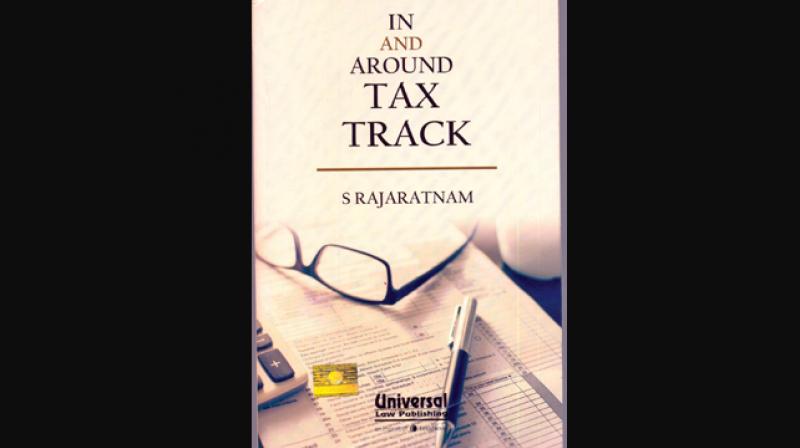When Jaya needed time to file correct return' and all that

Chennai: “There is difference between the Law as we know from the textbooks and the Law in practice. Enforcement of the Law is not an easy task. I realised my own responsibility in the Income-Tax (I-T) department as an Income-Tax officer who has to enforce the Law. I took great care to see that justice is not only done, but I saw to it that it was transparently done,” says the veteran taxman S Rajaratnam, in his recently published autobiography, much after having served as an impeccable IRS man for 33 long years in different capacities ranging from a tax assessor to member of the I-T Appellate Tribunal.
‘In And Around Tax Track’ as Rajaratnam’s memoir is self-effacingly titled, reflects that spirit of a series of honest re-telling of different phases, of a conscientious man’s long and arduous journey as an IRS officer since early 1950s, after hailing from a humble Nadar community family from the very place that produced one of Tamil Nadu’s greatest sons, K Kamaraj.
The anecdotal value of this memoir is itself its uniqueness, for not many retired officers would like to be so candid as Rajaratnam, which in turn shows that there is a higher calling for man above institutional facts. Their instructive quality, without being didactic, written in a simple, matter-of-fact yet sharp in the sensitivities it wishes to inform, is quite amazing, not just for serving government officers and tax practitioners, but for citizens as a whole coming to grips with contemporary puzzles of good governance.
Recalling a meeting with the former Chief Minister J Jayalalithaa, after his retirement, Rajaratnam annotating the details of a reply about the drafting of which her then chartered accountant had consulted him to a show-cause notice issued to her by the I-T department for “non-filing of wealth-tax return”, speaks volumes not only for Rajaratnam’s professional fairness, but also for the late AIADMK leader’s alacrity.
Quoting portions of the reply to the notice, as suggested by Rajaratnam, the then Chief Minister, explaining the circumstances for the delay in filing the return says, “my auditor tells me that he told the Assessing Officer that he had delayed the return of his client (Ms. J. Jayalalithaa), because she wanted to be sure that the return filed is a correct return, rather than an incorrect return in time.” But it was not accepted and eventually prosecution, in the backdrop of certain other political developments, was launched against Ms Jayalalithaa and the matter later settled by payment of Rs. 1.90 crore as “compounding fee, while the wealth tax payable was a small fraction,” But as Rajaratnam muses over that episode says, by avoiding trial, a “convincing reply on facts was lost.”
The Taxman’s memoir, dedicated to his wife, Smt. Jumna Rajaratnam, is strewn with such virtually countless anecdotes, for no two tax cases are ever the same. Right from his fist posting in Ahmedabad in 1952 - even then it was difficult to get a house on rent in Gujarat if you are not a vegetarian - Rajaratnam has methodically gone about chronicling his role as a tax assessor/administrator, performing his duty without fear or favour.
The range of the menu is literally enormous: From getting to see from a dismissed employee of an Engineering firm how ‘kutcha wahi’ (rough cash book) is maintained and later transferred to a ‘pucca wahi’ which ‘omits certain transactions to be (left) unaccounted’, nuances in creative accounting to show less income by assesses, an unforgettable episode in Rajkot where efforts to tax a philanthropic and well-meaning Ram devotee and sweet-maker, Ram Bhagat, had kicked up a public furore as to how the I-T department could be “harsh” with such a genuinely religious man, late Finance Minister T T Krishnamachari opening up through legislation certain new avenues for tax investigations and including even U.S. inputs, the famous I-T case involving the industrialist Ramakrishna Dalmia, to his own brushes with the legendary lawyer and constitutional luminary Nani Palkhivala when he appeared for I-T assesses before the Tribunal and so on, Rajaratnam’s autobiography is packed with nuggets of insightful information and legal twists. But as officer, he scrupulously lived up to his principles, not falling for even an apparently innocuous silver coin offered on one occasion, as seen in one of the episodes he has narrated in his book involving a Gujarati businessman.
Rajaratnam says he even once gracefully rebuffed such gift overtures as a ‘Kshatriya’ would, an elevated position in the Indian ‘Varna’ system his own community people back home in Virdhunagar had identified with, in countering centuries of social ostracism and discrimination the ‘Nadars’ had suffered in a feudal order prior to Indian Independence.
Thus, the other part of Rajaratnam’s memoir is an absorbing account of his early days: the discrimination his family had to face even in far-off Bombay and Gujarat from upper caste people including the Tamilians who migrated to North – one exception being his Brahmin teachers who were above all caste considerations - the stimulating intellectual environment in Madras Christian College where he enrolled for a B.A. (Hons.) in Economics, brief interludes with political leaders like Gandhi and Kamaraj as student Congress activist, embroilment with Social Justice Movement of Periyar, all come through with sociological sagacity. One little printer’s devil one noticed is the author’s mention of a Communist leader as ‘Balagangadharan’. Perhaps he meant ‘Baladandayutham’. Above all, it is a memoir to be read and relished.

